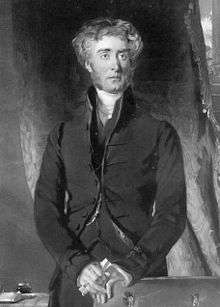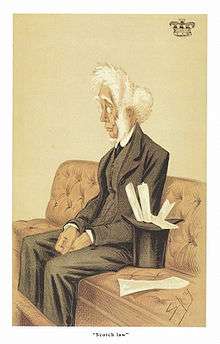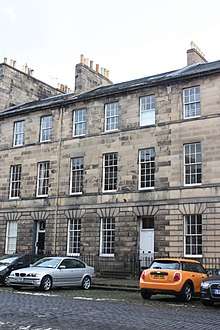Duncan McNeill, 1st Baron Colonsay
Duncan McNeill, 1st Baron Colonsay FRSE (20 August 1793 – 31 January 1874) was a Scottish advocate, judge and Tory politician. He was Lord Justice General and Lord President of the Court of Session between 1852 and 1867.


Lord Colonsay as caricatured by Spy (Leslie Ward) in Vanity Fair, September 1873

His younger brother was the physician and diplomat Sir John McNeill.[1]
Background and education
McNeill was born on the island of Oronsay in the Inner Hebrides, the son of John McNeill (1767–1846), laird of Colonsay and Oronsay, and his wife Hester (née McNeill).[2] Educated at St Andrew's University where he graduated MA in 1809..
He served his apprenticeship in Edinburgh under Michael Linning WS, based at 6 St James Square.[3] He became a member of the Faculty of Advocates in 1816. He was the presumptive father of philosopher Edmund Montgomery.[4]
Political, legal and judicial career
He was Advocate Depute in Edinburgh 1820 to 1824.
MacNeill was appointed Sheriff of Perthshire in 1824. He served under Sir Robert Peel as Solicitor General for Scotland from 1834 to 1835 and again from 1841 to 1842 and as Lord Advocate from 1842 to 1846.[5] From 1843 to 1851 he sat as Member of Parliament for Argyllshire.[6] In 1851 he was appointed a Senator of the College of Justice and an Ordinary Lord of Session as Lord Colonsay and Oronsay. He was Lord Justice General and Lord President of the Court of Session from 1852 to 1867, and was raised to the peerage as Baron Colonsay, of Colonsay and Oronsay in the County of Argyll, on 26 February 1867.[7][8][9]
Personal life

In 1829 he was elected a Fellow of the Royal Society of Edinburgh his proposer being John Shank More.[10]
In later life Edinburgh University awarded him an honorary doctorate (LLD).
McNeill was unmarried, but lived in a very large Georgian townhouse: 73 Great King Street in Edinburgh's Second New Town.[11]
He was a member of the Highland Society of Edinburgh (1833).
Lord Colonsay died at Pau, France, on 31 January 1874, aged 80, when the title became extinct.[12]
He was interred at Warriston Cemetery in Edinburgh, south of the upper east-west path towards the East Gate. His bronze coat of arms has been stolen from the monument.
References
- Waterston, Charles D; Macmillan Shearer, A (July 2006). Former Fellows of the Royal Society of Edinburgh 1783-2002: Biographical Index (PDF). II. Edinburgh: The Royal Society of Edinburgh. ISBN 978-0-902198-84-5. Archived from the original (PDF) on 4 October 2006. Retrieved 25 September 2010.
- Burke, Sir Bernard (1898). A genealogical and heraldic history of the landed gentry of Great Britain & Ireland. Harrison & Sons. p. 864.
- Edinburgh and Leith Post Office Directory 1800
- "Ney Museum-Edmund Montgomery". Elisabet Ney Museum. Archived from the original on 24 January 2010. Retrieved 29 October 2010.
- Campbell, George Douglas, Duke of Argyll; Campbell, Ina Erskine McNeill, Duchess of Argyll (2010) [1906]. Autobiography and Memoirs, Volume 1. Nabu Press. p. 268. ISBN 978-1-149-14037-6.
- "leighrayment.com House of Commons: Andover to Armagh South". Archived from the original on 20 October 2018. Retrieved 27 August 2010.
- "Appointments, Preferments and Promotions". The Gentleman's Magazine. 222: 373. 1867.
- "No. 23222". The London Gazette. 22 February 1867. p. 951.
- Fryde, E.B.; Greenway, D.E.; Porter, S.; Roy, I. (1996). Handbook of British Chronology. Cambridge University Press. p. 199. ISBN 978-0-521-56350-5.
- Biographical Index of Former Fellows of the Royal Society of Edinburgh 1783–2002 (PDF). The Royal Society of Edinburgh. July 2006. ISBN 0 902 198 84 X.
- Edinburgh and Leith Post Office Directories 1857 onwards
- Sheets, John W. "The Americans, The Earl of Selkirk and Colonsay's 1806 Emigrants to Prince Edward Island". The Island Register. Retrieved 31 October 2010.
External links
| Wikimedia Commons has media related to Duncan McNeill, 1st Baron Colonsay. |
- Hansard 1803–2005: contributions in Parliament by Duncan McNeill
| Parliament of the United Kingdom | ||
|---|---|---|
| Preceded by Alexander Cameron Campbell |
Member of Parliament for Argyllshire 1843–1851 |
Succeeded by Sir Archibald Islay Campbell, Bt. |
| Legal offices | ||
| Preceded by Andrew Skene |
Solicitor General for Scotland 1834–1835 |
Succeeded by John Cunninghame |
| Preceded by Thomas Maitland |
Solicitor General for Scotland 1841–1842 |
Succeeded by Adam Anderson |
| Preceded by Sir William Rae, Bt |
Lord Advocate 1842–1846 |
Succeeded by Andrew Rutherfurd |
| Preceded by Lord Boyle |
Lord Justice General 1852–1867 |
Succeeded by Lord Glencorse |
| Peerage of the United Kingdom | ||
| New creation | Baron Colonsay 1867–1874 |
Extinct |